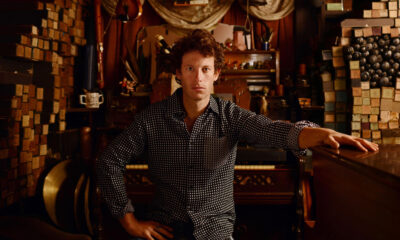Interviews
Shane Black Interview; Legendary Writer/Director Talks about ‘The Predator’, ‘Iron Man 3’, and Much More
Shane Black is what is known as a natural born prodigy in his given field. As a screenwriter, he sold his first script out of film school at twenty-two. He’s not exactly a lightweight.

Shane Black is what is known as a natural born prodigy in his given field. As a screenwriter, he sold his first script out of film school at twenty-two, which was the first instalment in the Lethal Weapon franchise. He’s not exactly a lightweight.
From there he went on to pen blockbusters like The Last Boy Scout starring Bruce Willis, who was hot off of Die Hard fame, and The Long Kiss Goodnight starring Samuel L. Jackson. Black has gone on to direct audacious outings such as Kiss Kiss Bang Bang, Iron Man 3, and The Nice Guys starring Ryan Gosling and Russell Crowe. Black is on deck to finish the new sequel in the Predator franchise due out next year.
Black was awesome enough to spend his time bending our ears here at PureGrainAudio recently. He gives us the exclusive scoop on what it’s like to be a Hollywood A-List screenwriter, dealing with major franchises, and what it’s like to make the new creature feature with The Predator! Buckle up boys and girls, because this one is going to be one hell of a ride.
The first question I actually had was what is your process in selecting your next project and how does that go? Is it timing? Opportunity? Going with your gut? Or a combination of all those factors?
Shane Black: There are projects that kind of nag you into at least addressing them. Those are kind of the spec projects. Those are the ones where I sit down unprompted and the ones I try to write on my own. Which are the most satisfying processes upfront because that first draft is the way you want it.
You’ll be subjected to all of these studio notes, but you do own the piece of material under the conditions that you’ll dictate, whether those being creative or monetary. So there’s a control to that respect that is really appealing IF the ideas are there. It’s a lonely process. Not matter how many sales you have, the next one always feels like you’re starting over from nothing, at least for me. And so there’s this sneaking suspicion where you’re typing away in your attic all by yourself about something that will be read, probably by your mother, and no one else.
(Alex laughs)
Black: So of course, when you get hired to write a script, you go to the studio and you take meetings and you can feel like you’re a part of something. I feel like you can argue that it takes a sort of leap of faith to write by yourself without being paid to do so without being beholden to anybody or any studio. Those ideas, while they’re fresh, you can write them ANY way you want. It’s a lonelier way to work. But there’s another way you can do it. Which I did on The Nice Guys, where you work on spec, where you bring in partners, so it’s not so lonely.
That’s what I did with a couple people, Anthony Bagarozzi, and others over the years. It’s just about managing your terror. To me, with writing, it’s writing process. If you wake up and you don’t have the elements in front of you, you have to trust that your brain will surface them. They will just bob up and you will have an idea. Anything to mitigate the terror, including involving a partner, takes some of the heat.
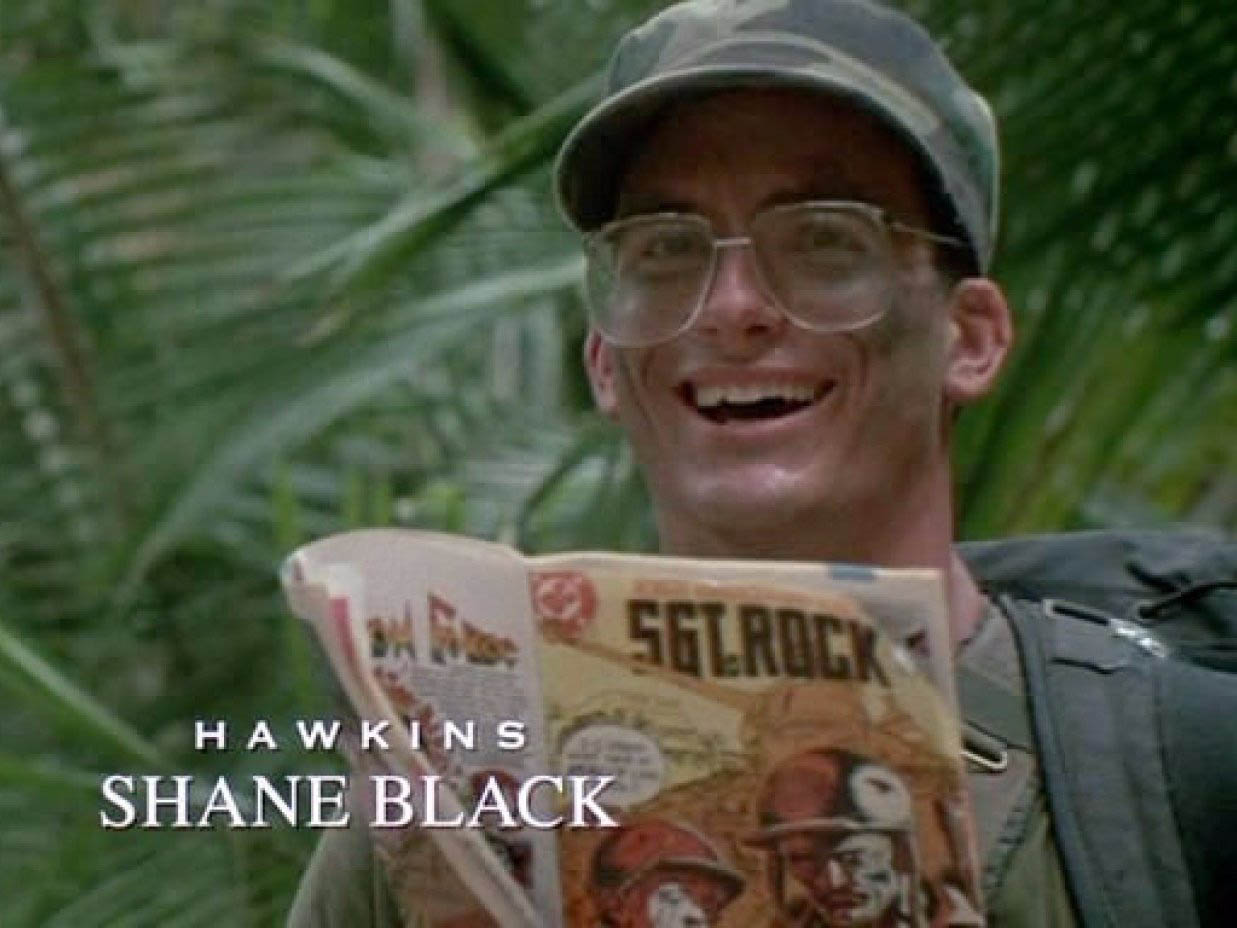
It must dilute that sense of self-imposed isolation to a certain degree.
Black: Yeah, because writing is basically a process of sitting down and forcing yourself to do it while you’re nervous and feel fraudulent. Until something that you’re writing momentarily grips you and is more interesting in that moment than your own fear.
So you’re afraid this is terrible and this is weird and, “Wait a minute, what if he said this…”, and what do the other characters do? Suddenly, you’re problem-solving instead of being afraid. So you’re just writing something in the moment more interesting than your own fear. Because your mind can’t be afraid and interested at the same time.
Yeah, it’s almost like that polarizing sense of trying to find your own path in a weird way up the middle. Even using that fear to your own advantage in a certain way.
Black: Yeah, I think people will approach things, especially big projects, or ambitious projects. If you don’t have that butterfly in the stomach, I don’t know how they would do it. If you’re trying something daunting or difficult, there’s always going to be some inherent, underlying fear that you might not thaw, that you might not get it right. I’m a big believer in anxiety management. I think trusting in your own brain in generating money-worthy ideas on a daily basis that are compelling and serve your passion. It’s really hard to maintain. The doubt creeps in, the anxiety creeps in, and you have to manage it somehow.
Yeah, and do you think that going into something that is almost like a horror project like The Predator almost helped you translate those feelings so you can help bring them alive on screen? Especially when it is a really terrifying character like that!
Black: I think it’s more about… The key to Predator has always been the group that goes up against the Predator. The trick is to get yourself inside the mindset of a group of men and women, mostly guys in those movies, sometimes with a female protagonist as well. Mostly in the AVP’s (Alien vs. Predator) as well, and Predators. You wanna find a balance. It’s not so much addressing the emotions of the characters or finding the fear in the horror film as much as finding what interests me about a horror film. Figuring out why I am the audience member I am for them.
What do I wanna see? And to that end, I just try to be the best audience I can. Not just write stuff that skewed through a story that connects the dots, but represents the version I would most like to see on the screen. Which is why I often try to see a trailer in my head. The sorts of images and emotions, what kind of music is in my head that trailer would be. To sort of sum up the movie we’re about to undertake.
What do you think are some of the biggest advantages and challenges with working with a popular character or an established franchise?
Black: The advantages, of course, are that you have a greater chance of an audience. You’ve gone a few steps further down the path to being a hit before you’ve even put pen to paper. Because you know that there are people you know that are fans that will see this movie, some of them regardless. Then the task becomes to give them what they want and more. The same and different in ways that twist and tweak. It gives you a chance to reach a broader range of people. It’s fun sometimes. Because it’s a franchise, the studio has rules attached to it. They don’t want to risk it, so they have supervision. Like the Iron Man one, I did for instance.
Yeah, absolutely.
Black: Very strictly overseen by the people who control that character because they’re not just going to let me do whatever I want. So it’s less control that way. They did offer me a surprising degree of latitude with Drew Pearce, the guy I wrote it with also.
Which is sort of weird because the fans got mad at me for the twist in Iron Man about the Mandarin. Where they felt I had “ruined the character” or had somehow compromised the canon of the comics by reinventing him in a way they felt was a betrayal. We just had a lot of fun with the notion of it. The idea that Marvel would let me do that and not have a say in it is… the fans think I just went off and did that by myself.
Yeah, it takes a lot of guts on both ends if you really think about it from you and the studio. To give someone that much creative leeway instead handcuffing them to an outline, or being like, “No, this is the way you’re going to make OUR movie, basically.”
Black: They did have a degree of control. That wholly was a group effort and I’m perfectly willing to take the bullet for what the fans didn’t like. I think it’s funny that the fans thought that was something that I came up with by myself.
One thing I really wanted to bring up, not just because it’s such a distinguishing factor of your style, but you have a very distinct precedent of not making movies to win awards. Or strut the red carpet, or be on the cover magazines or anything like that. You make movies that MATTER because they’re for AUDIENCES. How do you really think your relationship with fans, whether it’s Iron Man fans, or your audience has changed and evolved over the course of your career? Not just by the projects that you select, but how you have changed in tandem with that over time.
Black: Honestly, I don’t think too much about fans, I think about pleasing an audience, I really do. I know I want to be someone who’s an obscurantist. Who thinks, “I’m going to do whatever the hell I want, and they’ll have to keep up and pay attention. If they’re not entertained, that’s their problem.” No, to me, I’m too used to being in that seat where they are, where the audience is watching. To just sort of not constantly have one eye on the ball of, “Is this entertaining? Is this moving the plot forward? Are there enough twists and reversals?”
All the tricks that I’ve learned over the years from the various mentors I’ve had are not about keeping a fanbase. They’re just about being a better audience member and the storytelling that would please me the most. Because I consider myself a very demanding audience member, story-wise. Chances are I’ll be entertaining someone. I have a very high threshold for what I consider entertaining and a very low threshold for keeping stuff in that’s sort of indulgent. I don’t like making obscure movies that are boring to watch.
(Laughs) No kidding! Even though some people might try to peg you as a genre director, or an action guy or anything like that. Even if you wanted to look through that gaze, you’ve managed to diversify yourself in the action genre by doing blockbuster cop franchises, to major tentpole thrillers, to comic book movies, and even passion projects. What are some of the storytelling tools you use, not to reinvent the wheel so to speak, but to keep yourself excited? To keep yourself doing something fresh, to keep yourself looking forward and keep yourself from getting stuck in a rut.
Black: Well, you know there’s a writer named Evan Hunter who worked under the pen name of Ed McBain. I’ve always been a fan of mystery and thriller novels, of suspense, you know? He was a suspense novelist, and one thing he wrote that I always took to heart was, “Every movie’s a thriller.”
Think about it. It’s like in a romance, you know the girl breaks up with the guy because there’s a misunderstanding. He realizes that she’s at the airport, she’s leaving, he has to drive and get to the airport in time. Will he get there in time? Will he stop her? Come on! Come on! Get to the plane, she’s leaving! It’s a thriller.
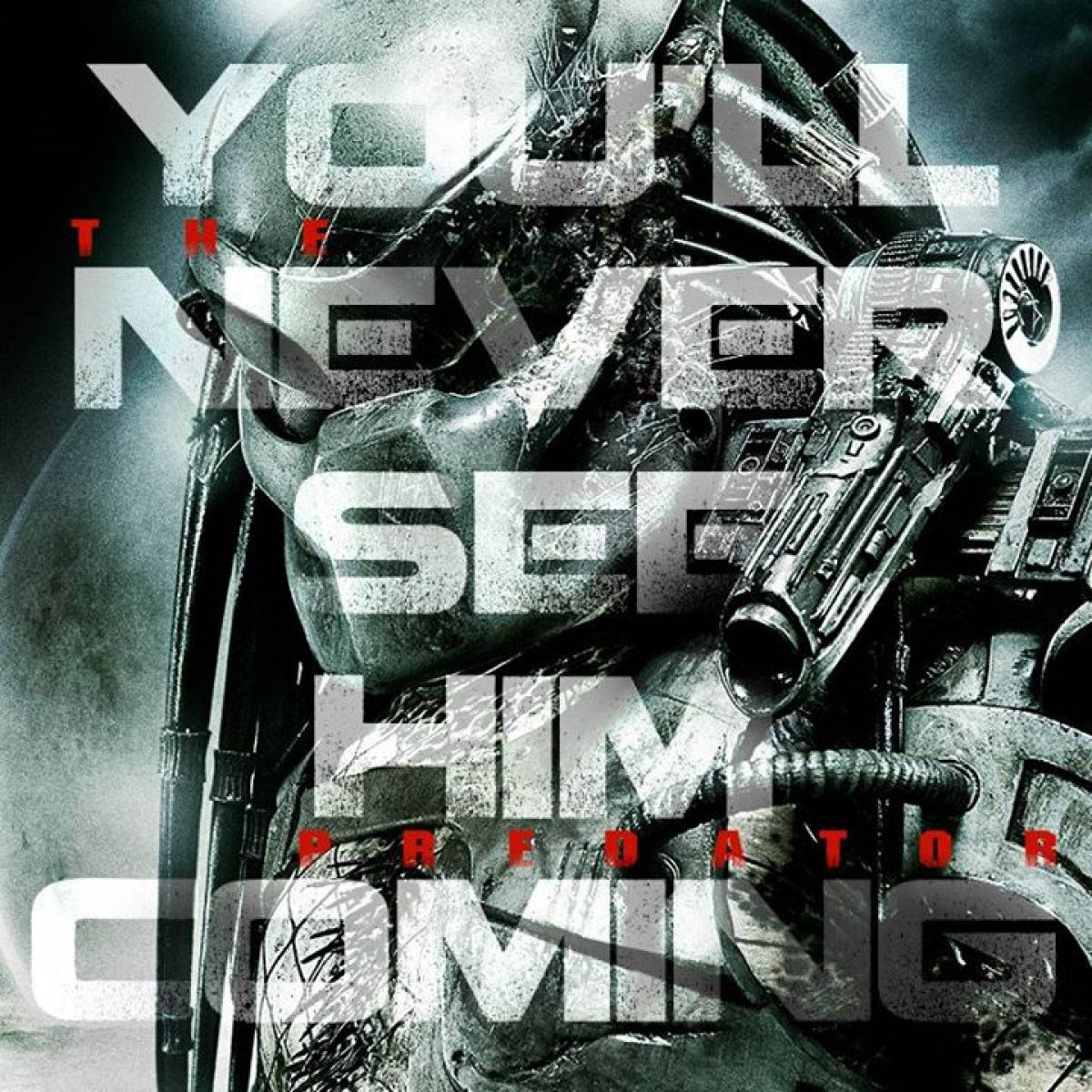
(Alex laughs)
Black: There’s a movie about a guy who’s kind of stuck in his ways, he hasn’t had an epiphany, he can’t get a breakthrough. People try to talk, “Come on man, just turn it around, and just change your thinking!” Even in a drama that’s just about mindsets and psychological change, you’re rooting for the change to happen, and you’re in suspense to see if it will. So he [Evan Hunter] said, “Everything is storytelling, storytelling is just suspense.”
You set something up, you want to see what happens next, and how it turns out. That’s the key for me to selling screenplays is make them turn the page, what happens next. You shouldn’t have to work to get someone to turn the page. They should say, “I could stop here, but just one more page, I want to see what happens.” That’s the acid test for me. Those are the storytelling tools. So suspense, narrative, what happens next, also set-ups and pay-offs, things that tie the script together, reversals, twists, always the unexpected.
There are also all kinds of things of making characters interesting, which I’ve taught classes about. These aren’t my ideas, this is a distillation of having read a novel a week for fifty years. And having the best mentors in the world, people I admire. Not just novelistically, but directors like [Academy Award Winner] Jim Brooks (Terms of Endearment, The Simpsons, As Good As It Gets, Broadcast News) was a great mentor for a while. People I worked with like [director/screenwriter/producer] Walter Hill and [Academy Award Winning screenwriter] William Goldman these were astonishing mentors.
Especially in the ’70s and the ’80s when they were at the peak of their powers. Walter Hill was doing everything from passion projects like The Driver to high profile stuff like 48 Hours and everything in between.
[Many regard the box office smash 48 Hours as the first premiere buddy cop action-comedy starring Eddie Murphy and Nick Nolte to be influential on Lethal Weapon.]
And doing the final draft for Alien [One of Hill’s major contribution being that he made the lead character Ripley a woman, which Sigourney Weaver played in three other installments in the franchise] and helping get B-movies made as A-movies instead of just letting them do the drive-in circuit or something like that.
That must have been an amazing, career changing experience. As well as like becoming a friend with somebody like that!
Black: I loved Walter. His advice and style of writing which tends to be very Spartan, very terse, sort of a revelation to me the same way William Goldman’s writing. Which was very sort of sly and conversational and sort of playing with the reader a little bit, he addressed it novelistically.
There was a degree of literature going on in Goldman’s scripts, a degree of really writing, not just saying, “He enters the room.” In the prose of the script, the guy was a novelist on paper, even when he was writing screenplays. There was a joy to reading Goldman’s scripts just like his finer novels. So between the two of them, I sort of slammed those styles together. What emerged in my mind was sort of a hybrid style, I think is based on the models provided by Walter Hill and William Goldman and the two of them taken together.
One thing that always really captivated me from reading their scripts on the internet were two things. They were always very precise and concise, always very lean and very clean. The other was the fact that they were able to translate their passions into different concepts. So you could look at Walter Hill and argue that all of his movies are Westerns in a way. Even if it is The Driver where it’s the Desperado and the Sheriff in Town, and he just wants to get his man.
Black: Without a doubt, everything he’s done is an urban Western or just a Western.
Yeah, and with William Goldman, he was almost the opposite in the sense that everyone’s like, “This is his greatest work, you’re never going to see him do anything better than that.” Then he turns around from doing Butch Cassidy & The Sundance Kid to All the President’s Men, where he goes from a story about these two gunslingers to what you would think would be a really boring movie about these two guys sitting behind a typewriter and it’s one of the most suspenseful, exciting movies about journalism you’re ever going to see.
Black: It has the structure of a thriller. It feels like it’s an actual thriller. It’s a great demonstration of the Evan Hunter principle I mentioned earlier. A movie about two guys tracking a story is presented in such a compelling, powerful way that you feel the excitement. You’re pulling for the guys like you’re pulling for the heroes in a spy thriller. I feel like Goldman is just a storytelling machine. He just has a soul to tell you a tale. He has a voice that has the inflected style that a lot of professors push.
The key to writing a good screenplay is to just let your writing style inflect this and shape it so people feel that they’re in good hands while they’re reading it. They’re in the hands of someone who cares about what they’re doing, not someone who’s out to make a buck. That is the truest thing. I’ve never sat down saying, “Oh jeez, I need to make a buck.”
It definitely shines through in your work I definitely think that’s something you might have stylistically inherited from both Hill and Goldman. Personally, I find all three of your styles, although being very different, you have overlapping similarities and the work ages really, really well. What do you think is one of the key defining factors in having a script that still holds up over the years?
Even looking in the case of Lethal Weapon, it was very much a movie of its era, but at the same time too, rather than feeling dated, it’s one of those films that helped define that era. Not juts 80s movies, but action films, that still holds up stylistically. What do you think helped you push through that, rather than feeling cheesy and lame ten years later?
Black: A good story doesn’t change. Part of my philosophy and the one shared by my friends too is not to make movies of the moment if we can help it. There’s a certain style of TV right now, which I see. There’s like a “V” of characters. One is in the front and they “V” away from them on either side. It’s a diverse cast of people with their arms crossed, looking into the camera. In each episode, they all have their A story but then they all have their B story, their soap opera story.
At the end of each episode, you see them going to bed at night to the same song, [Shane sings] like, “Say something, I’m breaking up with you.” They’re tucked in at night, their sleeping inside. That’s fine, it’s not that it doesn’t work, it’s just that that wasn’t TV twenty years ago and it’s not going to be ten years from now. It’s really just the way it’s being done now, and I think it will become dated. Because TV at it’s essence, is supposed to be disposable entertainment.
It’s not meant to last eons, it’s meant to last this next season in order to get another. In this [movies], you have an obligation to be sort of timeless. A good story is a good story, it doesn’t change. The Searchers is still The Searchers. It’s A Wonderful Life is still charming, Dirty Harry is still suspenseful, Jaws is still terrifying. These are movies that are prime, pristine examples of storytelling. The Exorcist is as compelling today and is absolutely frightening as it was when it was first released. It didn’t age. I took a friend of mine to see it recently, it scared her out of her wits.
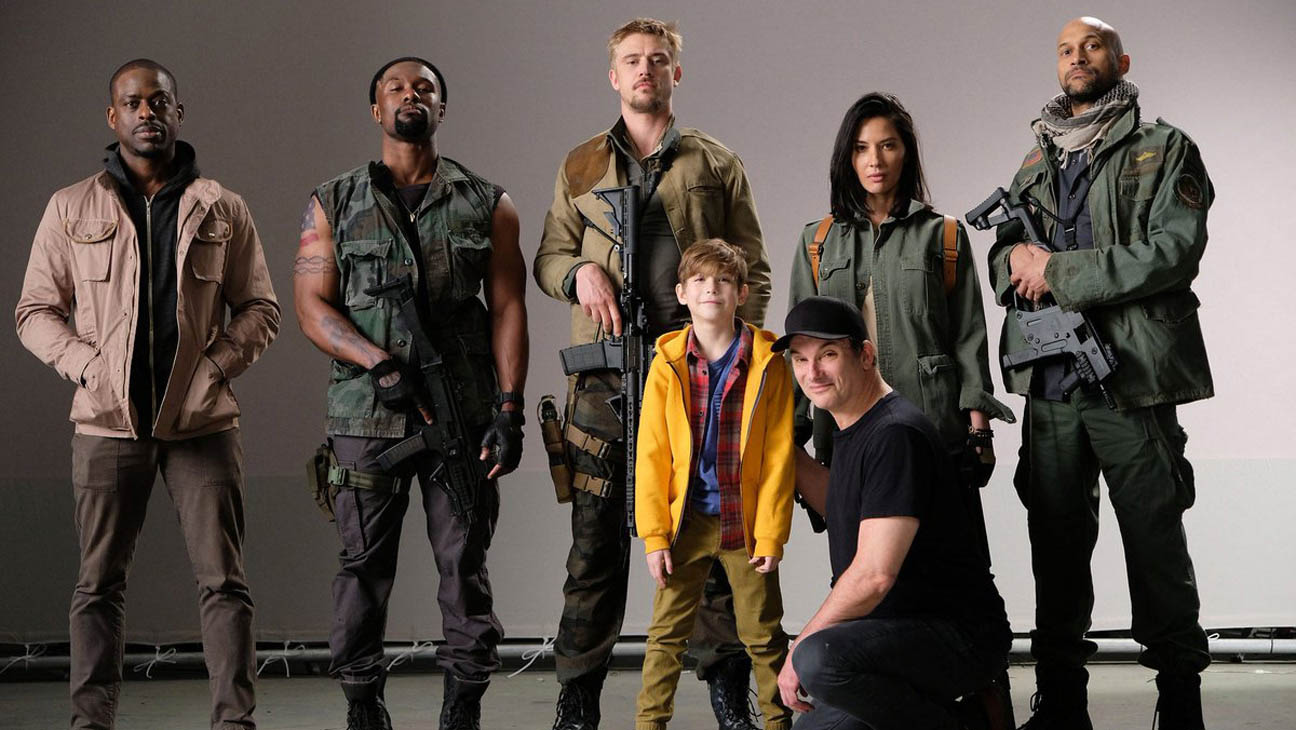
I believe it. I was lucky enough to see The Godfather on the big screen for the first time, the first time in a theater, not the first time period. They had it up for the forty-fifth anniversary of it and it was amazing! No wonder people looked at Marlon Brando and Al Pacino, guys like James Caan, as Gods and Kings of this world. Even just framing of it, they look larger than life on the big screen.
Black: Yeah, and it really is just about classic storytelling and it’s easy to get lost. There are so many movies going straight to Netflix. The trick is to keep your storytelling standards high and to try to be as iconic and impactful as you can. The gems, the ones that shine light no matter what way you look at them. If it’s enough of a gem it will persevere despite the passage of time.
I’m sure you’ve had plenty of offers to get wooed into TV. What are some of the biggest factors that made you stick to your guns and stay in your lane as you continued to pursue your signature style in movies? Despite how much the studio system has changed in the last ten years, let alone the last twenty.
Black: I don’t know that I know TV that well. I’ve made a couple forays into it. I’m used to a certain type of TV that I grew up with where you could tell different stories, really branch out, in the course of a season. Diversify. It seems like most of TV now, what they want is a binge quality. If it’s a twelve episode season, let’s say what they want is a novel with twelve chapters. It’s all one story, almost like one episode, comprised of twelve chapters.
So it’s a different way of writing. You’re really writing a twelve-hour movie. I love Breaking Bad, but I’m not sure I know how to do a three and a half year movie, that’s all just one story. They bring in a couple of different villains, but basically, it’s the tale from start to finish. It seems like one long movie. So everything becomes very novelistic in the sense that Game of Thrones is just an ongoing soap opera.
At its core, absolutely. It’s family drama.
Black: It’s really good. Most of House of Cards is a narrative soap opera, and of course, the first season had one standalone episode. Where he goes back to visit his college alumni friends, but other than that, every season has a book with ten chapters.
Yeah. If you could tell that twenty-two-year-old kid that just finished writing Lethal Weapon one thing, what would it be?
Black: I’d probably say don’t sweat the small stuff, and it’s all small stuff. It always seems like the end of the world, and looking back, it’s not. You always wish didn’t worry so much. I would just say to him, it’s gonna be okay.
The amount of anxiety in life and in the film business, breathing easy, trusting your instincts and… I try to make myself very small these days. I just sit down and try to eliminate my ego out of the equation and try to let some idea come through me onto the page. I’m thrilled to have been used as a conduit. I’m thrilled to have been prepared enough so that ideas found me to be an open vessel that they could briefly visit. Keep an open mind, have faith and know it’s going to be okay.
What’s on the horizon now? I know you were in talks for [The DC Comic movie version of] Doc Savage, but I was wondering what you have lined up after Predator? What’s exciting you about the possibility of diving into something next? Whether it’s a big blockbuster thing or you’re going to do another spec or wherever the chips may fall?
Black: I don’t know right now because I’m busy editing Predator. Editing has begun, so that’s a process not of weeks, but months. Predator is still a focus and will be until November at least. Along the way, I’ll see where things land and the chips fall. We talked about Doc Savage with Dwayne Johnson, but Dwayne’s dance card is pretty full.
No kidding!
Black: If there’s a slot for us, I don’t know. There might be, I think he wants to do it but you don’t always win. So if that’s the case I might have to shift to something. I’m open to it and I’ll just roll with it. In the meantime, if I have an idea that I think I want to sit down and write by myself, I’ll do that too. The only thing I want to create is something prolific, especially as I get older. I don’t know what I’ll do next after Predator, but I do know that I owe it to myself to first and foremost is to be prolific and not just drift.
Well, you do a pretty damn skippy job of that my friend from where I sit. I really, really appreciate you taking the time to do this. Especially because I figured you were going to be gearing up for editing with Predator ASAP.
Fan stuff aside, even as an inspiration for someone who writes specs and can’t wait to sit in your seat one day at the big table when my time comes, I appreciate the inspiration. It’s really great to meet somebody with not just the reputation and the body of work that you have but to see that you’re a great guy in person. You’re really in it for the audience and for the fans. That’s really great and incredibly rare. Thank you very much.
Black: That’s really sweet. I can be a prick too, so yeah, but I appreciate that. Thanks for getting in touch.
-

 Music5 days ago
Music5 days agoTake That (w/ Olly Murs) Kick Off Four-Night Leeds Stint with Hit-Laden Spectacular [Photos]
-

 Alternative/Rock6 days ago
Alternative/Rock6 days agoThe V13 Fix #010 w/ High on Fire, NOFX, My Dying Bride and more
-

 Alternative/Rock2 weeks ago
Alternative/Rock2 weeks agoA Rejuvenated Dream State are ‘Still Dreaming’ as They Bounce Into Manchester YES [Photos]
-

 Features5 days ago
Features5 days agoTour Diary: Gen & The Degenerates Party Their Way Across America
-

 Culture1 week ago
Culture1 week agoDan Carter & George Miller Chat Foodinati Live, Heavy Metal Charities and Pre-Gig Meals
-

 Music1 week ago
Music1 week agoReclusive Producer Stumbleine Premieres Beat-Driven New Single “Cinderhaze”
-

 Alternative/Rock1 week ago
Alternative/Rock1 week agoThree Lefts and a Right Premiere Their Guitar-Driven Single “Lovulator”
-
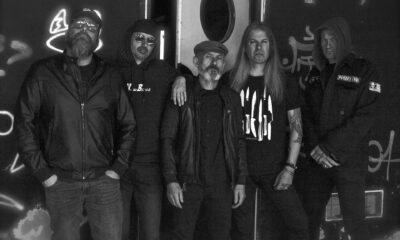
 Alternative/Rock1 week ago
Alternative/Rock1 week agoDeath Wishlist Are Fiery and Fierce with Their “I Get Bored” Video Premiere






